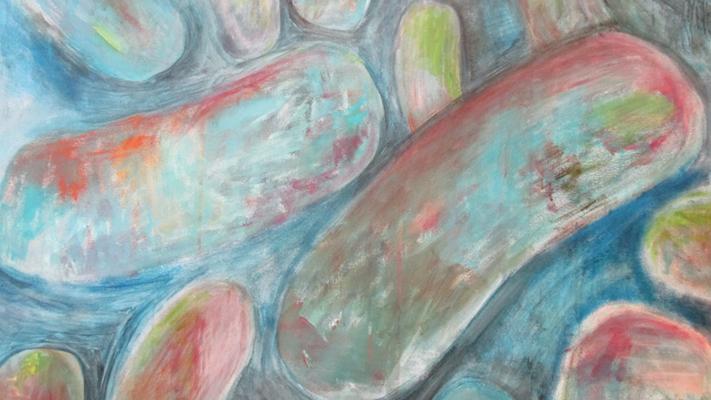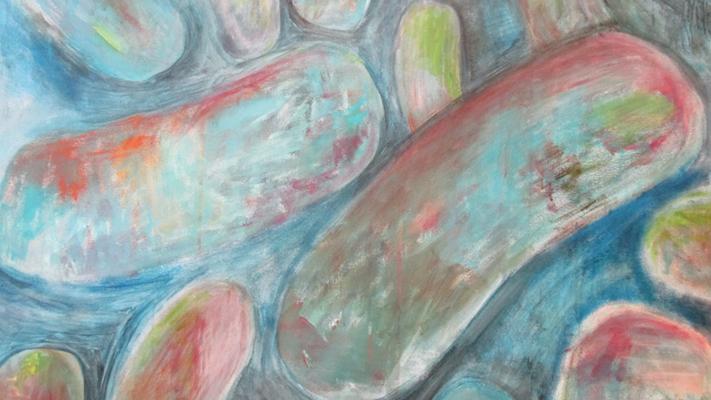
IMAGE: Thie is Clostridium difficile, or C. diff..
Credit: Renee Fox
New research from North Carolina State University and the University of Michigan finds that bile acids which are altered by bacteria normally living in the large intestine inhibit the growth of Clostridium difficile, or C. diff. C. diff is a harmful bacterium that can cause painful and sometimes fatal infections. The work sheds light on the ways in which some commonly used antibiotics can promote C. diff infections by killing off the bile acid-altering microbes.
C. diff exists in the environment as a dormant spore. To colonize the gut, C. diff. spores need to germinate and become growing bacteria that produce toxins and damage the large intestine. Researchers know that the use of certain antibiotics lead to a higher risk of C. diff infections, particularly among hospital patients. Casey Theriot, an assistant professor of infectious disease at NC State, wanted to know exactly how C. diff spores were interacting with the microbiota, or natural bacterial environment, within the gut.
"We know that within a healthy gut environment, the growth of C. diff is inhibited," Theriot says. "But we wanted to learn more about the mechanisms behind that inhibitory effect."
Bile acids are made from cholesterol and aid in the digestion and absorption of fats. They also control lipoprotein, glucose, drug and energy metabolism. Primary bile acids are made in the liver and travel through the intestinal tract. In the large intestine, bacteria convert these to secondary bile acids, of which Theriot found many have an inhibitory effect on C. diff growth.
Theriot started the project while a research investigator at the University of Michigan with infectious diseases physician Vincent Young and undergraduate researcher Alison Bowman. The researchers looked at the intestinal contents of mice before and after treatment with many different antibiotics. They identified 26 different primary and secondary bile acids and defined the concentrations of those acids before and after treatment. Then they added C. diff spores to the contents in order to find out how the bacterium may germinate and grow in an actual gut environment.
Interestingly, they found that the primary bile acids in the small intestine allowed spores to germinate, or begin to grow, regardless of the antibiotic treatment.
But when the spores reached the large intestine, where normal gut bacteria generate secondary bile acids, the researchers found that those secondary bile acids stopped the C. diff from growing. When those bacteria — and the secondary bile acids — were not present following antibiotic treatment, the C. diff was able to quickly grow.
"These findings are a first step in understanding how the gut microbiota regulates bile acids throughout the intestine," says Theriot. "Hopefully they will aid the development of future therapies for C. difficile infection and other metabolically relevant disorders such as obesity and diabetes."
###
The researchers' findings appear in mSphere. The research was funded by the National Institutes of Health (grant K01GM109236).
Note to editors: an abstract of the paper follows.
'Antibiotic induced alterations of the gut microbiota alter secondary bile acid production and allow for C. difficile spore germination and outgrowth in the large intestine'
DOI: 10.1128/mSphere.00045-15
Authors: Casey M. Theriot, NC State University; Vincent B. Young, Alison A. Bowman, University of Michigan
Published: Jan. 6, 2016 in mSphere
Abstract:
It is hypothesized that the depletion of microbial members responsible for converting primary bile acids into secondary bile acids reduces resistance to C. difficile colonization. To date, inhibition of C. difficile growth by secondary bile acids has only been shown in vitro. Using targeted bile acid metabolomics, we sought to define the physiologically relevant concentrations of primary and secondary bile acids present in the murine small and large intestinal tract and how these impact C. difficile dynamics. We treated mice with a variety of antibiotics to create distinct microbial and metabolic (bile acids) environments, and directly tested their ability to support or inhibit C. difficile spore germination and outgrowth ex vivo. Susceptibility to C. difficile in the large intestine was observed only after specific broad-spectrum antibiotic treatment (cefoperazone, clindamycin and vancomycin) and was accompanied by a significant loss of secondary bile acids (DCA, LCA, UDCA, HDCA, and ωMCA). These changes were correlated to the loss of specific microbiota community members, the Lachnospiraceae and Ruminococcaceae families. Additionally, physiological concentrations of secondary bile acids present during C. difficile resistance were able to inhibit spore germination and outgrowth in vitro. Interestingly, we observed that C. difficile spore germination and outgrowth was supported constantly in murine small intestinal content regardless of antibiotic perturbation, suggesting that targeting growth of C. difficile will prove most important for future therapeutics and antibiotic related changes are organ-specific. Understanding how the gut microbiota regulates bile acids throughout the intestine will aid the development of future therapies for C. difficile infection and other metabolically relevant disorders such as obesity and diabetes.
Media Contact
Tracey Peake
[email protected]
919-515-6142
@NCStateNews





